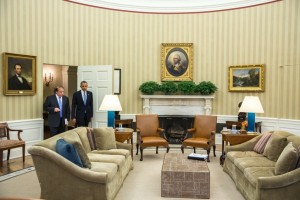[youtube]EYFhFYoDAo4[/youtube]
Most of the coverage of Admiral William McRaven’s letter to the special operations community telling them to shut up has focused on McRaven’s insinuation that the recent flurry of activity stems entirely from a desire for personal or political gain. But I find McRaven’s comments about what forms of publicity about special ops are appropriate just as interesting (thanks to Josh Rogin for linking a copy).
McRaven notes the importance of books on special operations as a learning tool.
Few senior SOF officers have benefited more from reading about the exploits of our legendary heroes than I. My thesis at the Naval Postgraduate School was based on a rigorous examination of the available literature, without which I could never have written my book on “The Theory of Special Operations.”
Most of these books were wonderful accounts of courage, leadership, tough decision making, and martial skill all of which benefited me as I tried to understand of our past and how it could affect missions in the future.
And he suggests that movies “provide public insights into life in special operations … that can’t be garnered anywhere else.”
Movies that portray the heroics of service members are also well worth watching and often provide the public insights into life in special operations or the service that can’t be garnered anywhere else.
Personally, I was motivated to join special operations after watching the movie, “The Green Berets”, starring John Wayne. To this day my Army brethren still wonder where I went wrong…
Countless stories have been told through the medium of film that needed to be told and I am thankful that they were.
Now, I’m grateful that McRaven has criticized OPSEC’s attempt to politicize the Osama bin Laden raid (though it does suggest a double standard). But these comments are rather troubling.
First, note that McRaven’s thesis depends on at least two first person narratives of special ops soldiers–those of Otto Skorzeny and Jonathan Netanyahu (though Netanyahu’s consists of his letters published after his death). So McRaven’s citation of his thesis hardly discredits Matt Bissonnette’s decision to publish his own first person account of his SEAL exploits.
I’m even more troubled by McRaven’s suggestion that we should turn to Hollywood to learn of stories “that need[] to be told.”
One reason he may do so is to legitimize the Administration’s cooperation with the Zero Dark Thirty team. If the Commander of SOCOM suggests Hollywood is the proper venue for special ops stories, it serves to distinguish the Administration’s push for publicity for the Osama bin Laden raid from that of the SEALs. (Though since Bissonnette’s already shopping his book, I expect McRaven’s position on movies may soon change.)
Of course, in doing so McRaven also suggests that fictional stories are all taxpayers should learn about these “stories that need to be told.” Not just fictional ones, either, but sensational ones. The better to inspire a future head of SOCOM to join the military, just like John Wayne did for McRaven!
Of course, that says taxpayers should only have a false understanding of the wars being fought in their names, which is a profoundly contemptuous view. I have no idea whether Bissonnette’s narrative will be accurate (the Pentagon has gotten a copy and is reading it now, so they may seize it before we get to see). But if it is accurate, why should a Hollywood movie be a more valid telling of the OBL story than the kind of firsthand account McRaven himself has relied upon?
Plus, by endorsing sensational Hollywood narratives, McRaven effectively endorses the kind of special ops hero that would, himself, seek publicity. You can’t have Hollywood serve as the legitimate venue for discussing special operations without feeding the system that would lead a SEAL to want to write his own book and sell the rights to Steven Spielberg. Hollywood created the market for such books; you can’t expect veterans not to feed it.
If the Commander of SOCOM believes the stories of special ops need to be told, then he should declassify them so they can be told in a format that is factual, sober, and complete. This endorsement of Hollywood flicks–while it may serve the Administration’s immediate interests–makes the Administration’s abuse of information asymmetry even worse. It defends not only the Administration getting exclusive control over how to the tell the stories, but suggests it should do so using fictional and sensational means.

